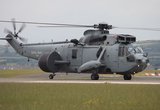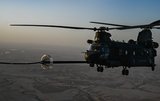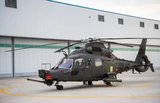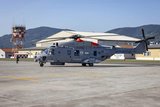NLR assists in world premiere of biofuel-powered Apache helicopter
A Royal Netherlands Air Force Apache (AH-64D) helicopter recently conducted a successful flight test at Gilzen-Rijen Air Base, in the Netherlands, during which one of the helicopter’s two engines was powered by an alternative biofuel.
The National Aerospace Laboratory (NLR) provided the Royal Air Force with support during the preparations for and conducting of the flight tests.
NLR supports the Royal Air Force in its drive to demonstrate that a blend of sustainable bio-kerosene and standard aviation jet fuel can meet the standard requirements for airworthiness.
Months of preparations were done prior to the flight, during which time the Dutch Ministry of Defense closely collaborated with various organizations, including Boeing, Honeywell UOP, NLR, SkyNRG, Ingrepro, KLM and General Electric.
The world premiere of this biofuel-powered helicopter generated great interest among the various media and invited guests. During the flight tests, one of the Apache’s engines was powered by a 50/50 bio-kerosene and traditional jet fuel blend, which was produced using algae-based biomass (5%) and used cooking oil (45%) - a world’s first and milestone in rotorcraft aviation.
For the Ministry of Defense, the search for a stabile fuel source, offering outstanding performance and lower CO2 and NOx emissions, is the primary driver for initiating and following up on developments in the field of alternative, aviation-grade biofuels and sustainable energy. Algae are regarded as the most promising and sustainable ‘feedstock’ for producing alternative biofuels, as it is a feedstock that offers a high return of bio-oil per production volume.
In order to further improve the sustainability of bio-fuels, CO2 and waste water can also be used in the production process of the algae. The Netherlands has an outstanding foundation of knowledge for the production of algae, for its conversion to aircraft fuel, and for its use in military and civilian aircraft. It is expected however that a further 8 to 10 years of development will be required before it is possible to use algae to produce synthetic bio-kerosene on an industrial scale.
During the Apache helicopter’s flight tests, NLR took various measurements using the Generic Instrumentation System (GIS). GIS is a system NLR developed to measure and save aircraft data, whereby the data can then be quickly processed using the Omega data processing system. GIS measures performance indicators and other relevant system data, thus allowing researchers to determine that, for example, both engines operated within the permissible operational limits, and that the helicopter and crew did not face any flight safety risks.
This was required in order to receive an NTO (No Technical Objection) from Boeing and the Military Aviation Authority (Militaire Luchtvaart Autoriteit - MLA), so that the flight tests could be conducted. The flight tests were successfully completed. Over the course of the next few months, NLR will evaluate the collected measurement data.
In the context of NATO, NLR is also involved in alternative biofuel research, whereby the Netherlands closely collaborates with other NATO countries to map the technological developments in the field of alternative fuel sources. Research in this area is also being conducted to identify possible compatibility risks in the use of alternative biofuels in current and future military systems (land, sea, air). In this framework, quality assurance and monitoring the performance of engines and fuel systems are crucial.
This flight test provides extra motivation for the use of alternative biofuels in military and civilian aviation. It also serves as a supplement to the aims – as defined in the Aviation Knowledge and Innovation Agenda (Kennis en Innovatie Agenda Luchtvaart -KIA) – of starting initiatives that will lead to the production and use of alternative biofuels in the aviation sector.
Source: National Aerospace Laboratory (NLR)
More from Defence Helicopter
-
![Germany to send WS-61 Westland Sea King helicopters to Ukraine]()
Germany to send WS-61 Westland Sea King helicopters to Ukraine
Germany has committed to sending Ukraine six of its 21 retiring WS-61 Westland Sea King multirole, amphibious helicopters.
-
![Boeing secures $271 million to advance modernisation of US Special Operations' MH-47G Chinook]()
Boeing secures $271 million to advance modernisation of US Special Operations' MH-47G Chinook
Boeing has clinched a major contract modification to further its backing of the US Special Operations Command’s MH-47G Chinook aircraft modernisation effort.
-
![Dubai Airshow 2023: South Korean homegrown helicopters make international debut]()
Dubai Airshow 2023: South Korean homegrown helicopters make international debut
Two KAI helicopters, the KUH-1E utility helicopter and the Light Attack Helicopter (LAH), have taken centre stage at the Dubai Airshow 2023.
-
![Italian Navy receives final NH90 helicopter]()
Italian Navy receives final NH90 helicopter
The Italian Navy now boasts a fleet of 56 NH90 helicopters comprising 46 SH-90As and 10 MH-90As.
-
![Argentina seeks AW109 and CH-46 Sea Knight helicopters]()
Argentina seeks AW109 and CH-46 Sea Knight helicopters
The Argentinian Air Force (FAA) and the Argentinian Naval Aviation Command (COAN) are looking for options to upgrade their helicopter fleets.
-
![DSEI 2023: Lockheed to produce about 40% of Black Hawks on UK soil if it wins NMH contest]()
DSEI 2023: Lockheed to produce about 40% of Black Hawks on UK soil if it wins NMH contest
Lockheed Martin promises a boost to the British job market and export opportunities, while strengthening ties with Poland and positioning the UK for a future in rotorcraft technology in the event of a New Medium Helicopter competition triumph.

























